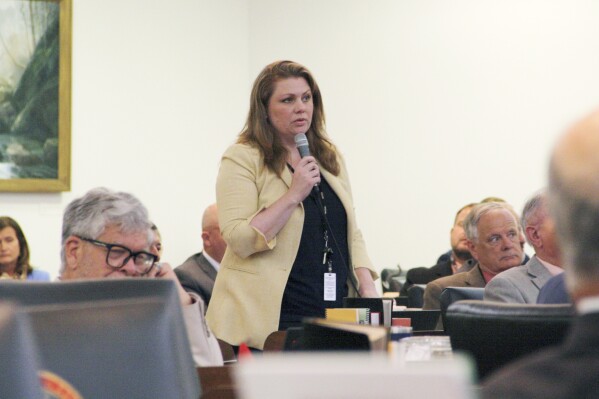Bill OK’d by North Carolina House panel would end automatic removal of some criminal records
RALEIGH, N.C. (AP) — An effort that formally started four years ago to automatically get rid of many more North Carolina criminal court records would be eliminated if legislation approved by a House committee Wednesday gets enacted.
The bipartisan 2020 law in part directed state officials to develop a process under which criminal charges that are dismissed or that result in “not guilty” verdicts or “not responsible” findings are deleted from a person’s record without a formal request.
The changes were within a broader “second chance” movement in North Carolina and nationwide that has allowed people with some criminal convictions already to ask to get their records removed, helping them avoid obstacles to obtaining employment or housing.
The automatic expunction portion of the law began in late 2021, resulting in over a half-million total record deletions in just eight months — a massive increase and operational challenge for the court system compared with the original petition-based process.
So the legislature agreed to suspend the automatic expunctions in August 2022 and told the courts to create a group that makes recommendations to fix problems, which included handling and retaining paper records confidentially. The resumption, delayed twice, is now set for July 1.



The state Senate unanimously approved a bill last year that carries out the group recommendations and restarts the automatic process on Dec. 1. But a House judiciary committee voted on Wednesday to change that Senate bill by repealing the automatic expunctions altogether.
GOP Rep. Sarah Stevens of Surry County, the committee chairman shepherding the change, said there were still many technical and legal problems that haven’t been resolved that create complications for defendants and court officials. She said county clerks didn’t want to suspend the process any longer unless there was a fix, since at least 1 million cases on backlog would have to be addressed.
Stevens said the state’s ongoing rollout of an electronic court filing and case management system means expunctions will remain more challenging in counties where it’s not online. Applicants could still fill out a form to have these dismissals or not-guilty verdicts removed, she said.
“It’s not that we’re not willing to visit (it) again, and it’s not that there’s not a remedy to get your dismissal expunged,” said Stevens, who is also an attorney. “But right now, this system was not working for the clerks, for the DA’s, even for the defendants.”
Criminal justice reform and civil liberties advocates urged the committee to pass the 2023 Senate bill, saying lawmakers made a promise by enacting the 2020 law that the records would be automatically removed.
Stevens’ bill “would undo all of the hard work put in by legislators and many, many stakeholders to remove barriers a criminal record places on a person’s ability to integrate and participate in society,” said Reighlah Collins of the American Civil Liberties Union of North Carolina.
Democratic Rep. Marcia Morey, a former District Court judge, said it was “abominable” to “erase the erasure,” and seeking expunctions through a petition process could take a year or longer.
“A solution is not to throw this out,” Morey said before the measure passed on a divided voice vote.
The 2023 Senate bill says the Administrative Office of the Courts would maintain expunged records electronically for local clerks, who could only reveal a record’s existence to a district attorney’s office or the ex-defendant and their attorney. A memo from the administrative office also says the state’s new “e-courts” software already manages expunction processing in all 100 counties.
The new version of the bill would have to clear one more committee before going to the full House. Affirmative votes would send the measure back to the Senate, which would have to decide whether to accept the changes.
Disclaimer: The copyright of this article belongs to the original author. Reposting this article is solely for the purpose of information dissemination and does not constitute any investment advice. If there is any infringement, please contact us immediately. We will make corrections or deletions as necessary. Thank you.





